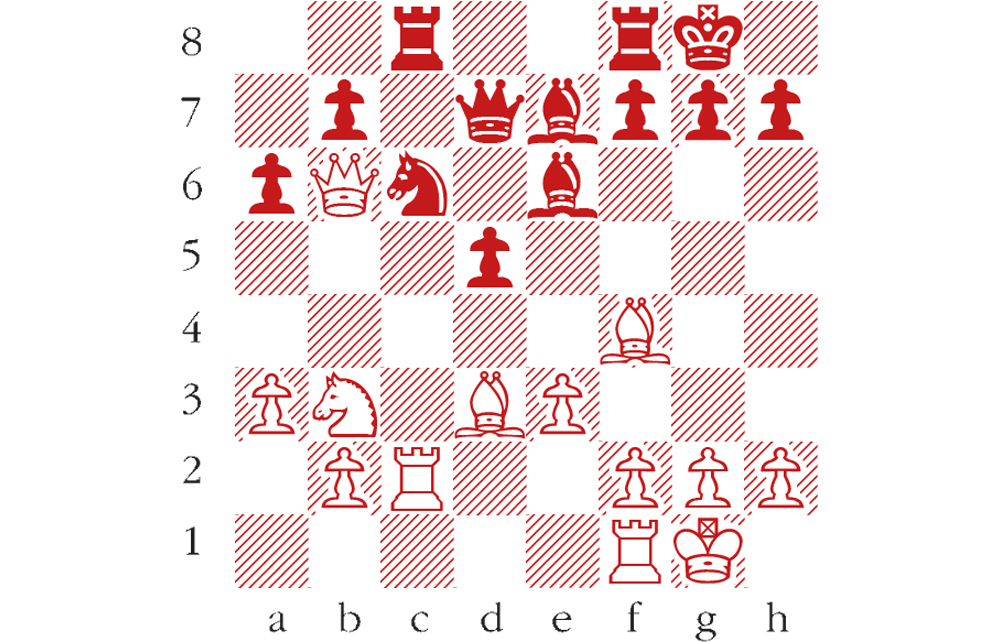‘The greatest pleasure? When you break his ego.’ So said Bobby Fischer on the Dick Cavett Show in 1971. He was right, of course – experienced players can sense that moment of mental despair in the opponent, which may arrive well before the outstretched hand of resignation. In fact, getting an accurate read on the opponent’s mood can be valuable at any stage of the game. Body language clues are the most obvious, but there’s plenty to be gleaned from the moves alone. Perhaps the game reaches an obvious junction, where the opponent can choose between a safe, solid option, and something more adventurous. The choice itself speaks volumes, and the time spent on the decision can be no less significant. I once ventured a sacrifice against a strong opponent, which wasn’t exactly a bluff, but I knew that the best response was to grab the piece and weather the storm. To my surprise, the sacrifice was declined outright, and I could feel that the psychological battle was already decided in my favour.
Another evergreen clue comes from the opponent who is overly eager to steer the game towards a draw, perhaps by exchanging off all the pieces. The stronger player ostensibly accedes to this, but extracts a small strategic benefit from each exchange, which snowballs into an overwhelming advantage.
Levon Aronian is a world-class player, but even he seemed to reveal his peaceful intentions a little too readily in a game against Ian Nepomniachtchi from the WR Masters in Düsseldorf last month. At that stage, Aronian led the tournament, so a draw would suit him well. But his opening was somewhat anaemic, and at move 23 he mistakenly tried to claim a draw by threefold repetition. His claim was subtly incorrect, so the game continued, although many players in Nepomniachtchi’s position would have plodded on toward the reptition. But Nepomniachtchi, admirably bloody-minded, seemed galvanised by Aronian’s moment of weakness. ‘Nepo’ went on the offensive, and though Aronian’s position was not inferior, he seemed unprepared for the sharp turn of events, blundering a surprise tactic a few moves later. (Aronian recovered and went on to triumph in the playoff for first place.)
Levon Aronian–Ian Nepomniachtchi
WR Chess Masters, Düsseldorf, February 2023
1 d4 Nf6 2 c4 e6 3 Nf3 d5 4 Nc3 Be7 5 Bf4 O-O 6 e3 c5 7 dxc5 Bxc5 8 cxd5 Nxd5 9 Nxd5 exd5 10 Bd3 Bb4+ 11 Nd2 Nc6 12 O-O Be7 13 Qb3 Bf6 14 a3 Qe7 15 Rac1 Be6 16 Qb5 Rac8 17 Rc2 a6 18 Qb6 Qd7 19 Nb3 Bd8 20 Qc5 Be7 21 Qb6 Bd8 22 Qc5 Be7 23 Qb6 (see diagram) Aronian mistakenly tried to claim a repetition, based on a repeat of the position at moves 21 and 19. But at move 19, Black’s bishop was still on f6. g5 Seizing the initiative. 24 Bg3 Bd8 25 Qc5 Be7 26 Qb6 f5 27 f3 Bd8 28 Qc5 Be7 29 Qb6 Bd8 30 Qc5 f4 31 exf4 gxf4 32 Bf2 Be7 33 Qb6 Bd8 34 Qc5 Bf6 35 Rfc1 Qg7 36 Qd6 Rce8 37 Re1 Ne5 38 Nd4 A natural move, but a big mistake. Bh3 39 Bf1 39 Qxd5+ Nf7 40 Bf1 transposes to the game. Nf7! The Bf2 is overloaded, so White loses a knight. 40 Qxd5 Rxe1 41 Bxe1 Bxd4+ White is a piece down with little to show for it. 42 Kh1 Bc8 43 Bc4 Re8 44 Bb4 Qf6 45 Bd3 Bc3 A funny ruse, exploiting White’s weak back rank to engineer an exchange of bishops. 46 Bxc3 Qxc3 47 g4 Qf6 48 Rc7 Re1+ 49 Kg2 Be6 50 Qh5 Qxb2+ 51 Kh3 h6 52 Qg6+ Qg7 53 Kh4 Rh1 White resigns






Comments